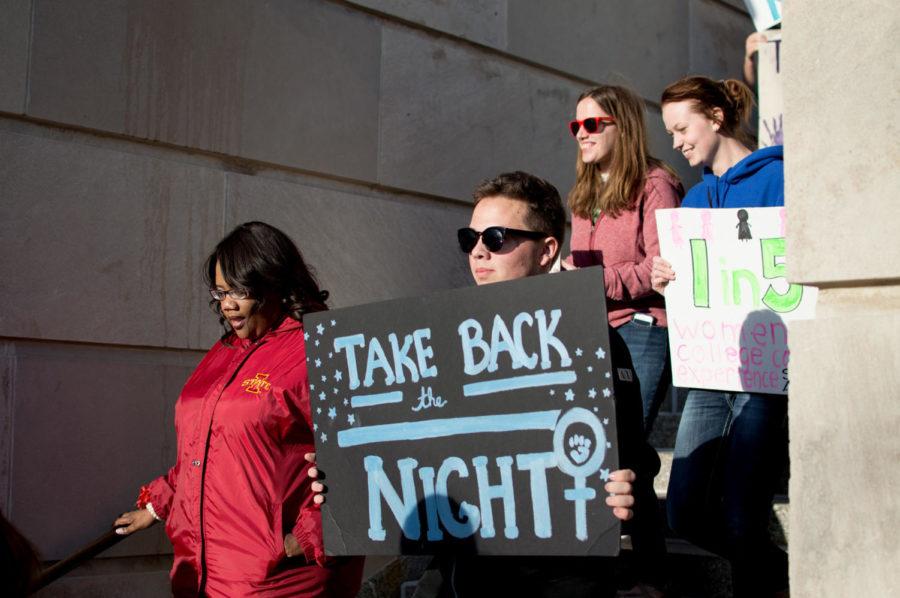Community gathers to take back its sense of safety at night
Charlie Coffey/Iowa State Daily
Participants of “Take Back the Night” walk hold signs while walking through campus. The event was provided April 22 to promote awareness about sexual assault.
April 22, 2015
Editor’s note: The following article may trigger an emotional response for sexual assault survivors.
The night belongs to us and the dark is not something we should have to fear, said attendees of Iowa State’s Take Back the Night event Wednesday.
The annual event meant to empower sexual assault survivors was attended by more than 200 students, survivors, advocates and faculty members, including ISU Police Department staff and Dean of Students Pamela Anthony.
Before the 30-minute walk across campus, survivors and advocates shared their personal stories and opinions on sexual assault and the culture around Ames and across the nation they believe perpetuates sexual assault.
Itzel Padron Zuniga, junior in women’s studies, said though Take Back the Night is beneficial, it should be unnecessary.
“Women everywhere are taught to be at home at night because surely they will be safe,” Zuniga said. “The message we are given is that only men have the right to feel safe at all times of the day, that for the rest of our lives — for six to eight hours every day — 50 percent of the population should be absent from public spaces and to fail to do so should be putting ourselves at risk.”
Zuniga said victim blaming the women and men who have been sexually assaulted is ludicrous but is still an action she encounters often.
“This weekend someone said to me, ‘If you put a worm on a hook, the fish will bite.’ We know better. We know our bodies are not bait and that adult women should not have curfews,” Zuniga said.
Katherine, an ISU graduate student, shared her personal story of sexual assault.
Katherine was assaulted in her cabin bunk by a co-worker she considered a friend four years ago while working as a lifeguard at a YMCA summer camp. She began her speech detailing the emotions that constantly accompany her and flashbacks that occur both day and night. The feeling of helplessness she felt returns through her inability to wake fully from sleep while she dreams of her assault. The dreams happen several times a night, Katherine said.
It took four years for her to talk to someone about her assault. When she finally told her aunt, her aunt said the most helpful thing anyone could say to her, which was ‘I believe you,’ Katherine said.
“I’m a survivor but I won’t let that word define me,” Katherine said.
Mary Sirna, a staff member from the ISU Police Department who works with sexual assault victims, said when she first began her job, she wanted to put “the bad guys” in jail. Her perspective changed.
“I realized the ‘win’ wasn’t necessarily a conviction. The ‘win’ could be a case where a victim felt heard, and that’s so much more important. I have cases that went all the way through jury trials and we got convictions. In the process, those victims’ lives were devastated,” Sirna said.
Sirna said she has read many police reports and medical records that said “patient alleged sexual assault.”
“Never once in a medical exam did it read ‘a patient alleged heart attack. Never did I see an alleged theft or an alleged motor vehicle accident. That’s because we didn’t believe them,” Sirna said.







